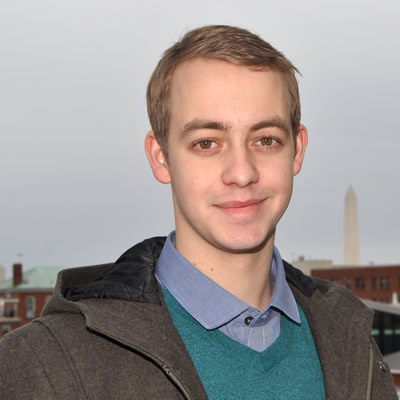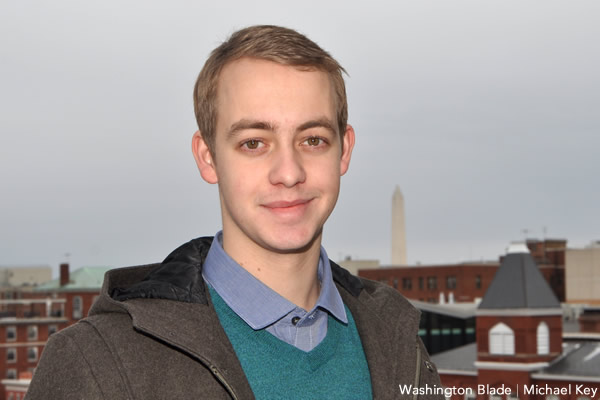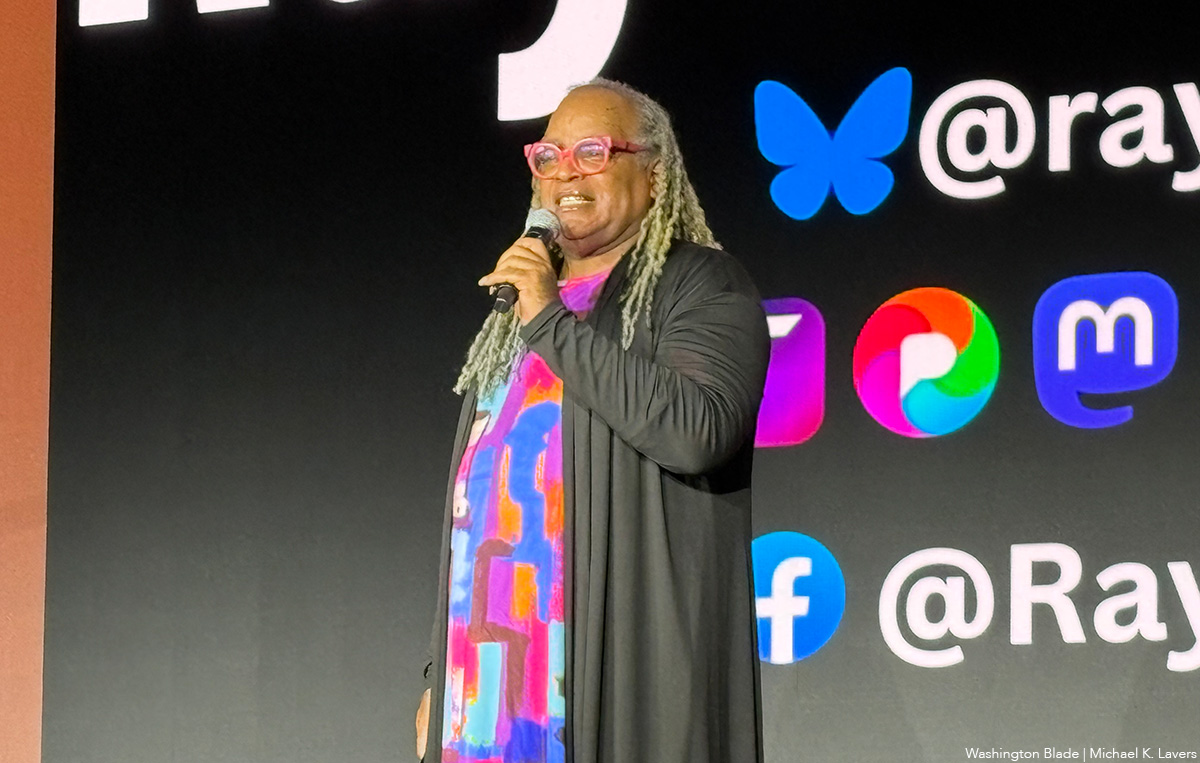Local
Spencer Perry continues moms’ tradition of activism
Son of Prop 8 plaintiffs reflects on marriage fight, stays involved at GWU


Spencer Perry is a student at George Washington University and the son of Prop 8’s plaintiffs. (Washington Blade photo by Michael Key)
Spencer Perry takes after his parents.
The 19-year-old son of the lesbian plaintiff couple in the case against California’s Proposition 8 is straight, but as a freshman at George Washington University, he’s taken leadership roles in the school’s gay-straight alliance and LGBT graduate program.
In an interview with the Washington Blade at GWU’s Duques Hall, Spencer says he would pursue LGBT activism even if his parents — Kris Perry and Sandy Stier — weren’t plaintiffs in the case that restored marriage equality to California, because of his experience in youth government programs during his adolescence.
“Sometimes I got the opportunity to travel across the country and meet others with different views on LGBT rights,” Perry says. “More often than not, I found myself even just in conversations casually, advocating for my parents and advocating for the family that we have and families just like theirs. I really felt proud of myself doing that. It was a good feeling and I wanted to keep pursuing it.”
After growing up in Berkeley, Calif., which he calls a “bubble” in terms of support for LGBT people, Spencer enrolled at GWU, where he double majors in political science and economics. Shortly after enrolling, he was elected freshman representative for Allied in Pride and was appointed as a board member of GWU’s LGBT Health Graduate Certificate Program.
He moved to D.C., where he lives on campus at Thurston Hall, at the same time his parents relocated to the area after Kris Perry accepted a job as executive director of the First Five Years Fund, a non-profit that seeks early childhood education for disadvantaged children.
Spencer says his focus at Allied in Pride is getting the culture at GWU “to be more embracing of LGBT individuals” on campus.
The next big task? Preparing for the second annual amateur drag show set for Feb. 13 called “Allied in Greek” — a collaboration between the Allied in Pride and Greek life in which members of GWU’s fraternities and sororities dress up in drag. The goal for the event, which will take place at 7 p.m. at Lisner Auditorium, is to show support for fellow LGBT students and benefit The Trevor Project, which seeks to help LGBT youth considering suicide.
Nick Gumas, who’s gay and president of Allied in Pride, praised Perry.
“Spencer has been an important part of Allied in Pride since he joined at the start of last semester,” Gumas says. “He always brings his creativity and positive energy to all of our meetings and events. It has been an absolute pleasure getting to know Spencer and I know he is going to continue to do great things in the future.”
Spencer knows firsthand the feeling of having the rights of his family taken from him. On Election Day in 2008 — the same day that President Obama was elected to office — voters in California approved Prop 8, rescinding the marriage rights that gay couples already enjoyed in the state.
“Anyone will tell you who lived in California and is part of the LGBT community, that was a very embarrassing moment because No. 1, we elected a phenomenal president, the first black president, which was a terrific feeling to be part of that, but at the same time, Proposition 8 was passed, too,” he says.
The day the California Supreme Court upheld Prop 8, Kris Perry and Stier — along with Los Angeles couple Paul Katami and Jeffrey Zarrillo — filed a lawsuit in federal court seeking to overturn Prop 8. They were represented by the legal dream team of Ted Olson and David Boies, who were hired by the then newly formed American Foundation for Equal Rights.
The lawsuit wasn’t filed before Kris Perry, his birth mother, and Stier, who became his stepmother after a previous relationship Kris Perry had with another woman, asked their four children, including Spencer and his twin brother Elliott, whether it was OK.
“I remember one day after school right before dinner around that time, Kris and Sandy sat us down,” Spencer says. “They said, ‘Listen, we’ve been approached by this group called AFER and they’re interested in pursuing a lawsuit to overturn Proposition 8 as unconstitutional. We’re very interested, but we want to make a collective decision as a family. So they asked us if Elliott and I would be OK with that.”
It didn’t take much to convince Spencer to be willing to come on board.
“Elliott and I jumped at the opportunity,” he says.
At first, Spencer says his parents “did their darndest to keep us kind of protected” from the public interest surrounding the case. But as the case proceeded through the district court, to the U.S. Ninth Circuit Court of Appeals and to the Supreme Court, and Spencer grew older and more interested in public affairs, he was able to speak out and talked to media outlets.
“I really did enjoy it,” Spencer says. “Not to be someone who’s devoted to attention, but it really was a good feeling to voice my opinion and to make sure people understand there are kids who have gay parents all across America.”
In addition to speaking at various news conferences, Spencer gave interviews to the San Francisco Chronicle, People magazine, the Los Angeles Times and New York Times, among others
One of the views against same-sex marriage that Spencer had to address — and one that he was living proof to counter — was the often-used argument that children of same-sex parents don’t fare as well as those raised by their opposite-sex biological parents.
“I’ve heard the argument a million and one times, but if anything, my gut reaction is that it’s kind of hurtful to hear that because my parents love each other, I’m worse off for it,” Spencer says. “I can’t tell you how loving and proud, and just absolutely supportive, my parents are of me. And how much better I am for them being my parents.”
After years of litigation, the case ended up before the U.S. Supreme Court, where justices ruled 5-4 that proponents of Prop 8 had no standing to defend the lawsuit, leaving in place a U.S. District Court decision from Judge Vaughn Walker that overturned the amendment on the grounds that it violated the equal protection rights of gay couples in the state.
But before that momentous decision, the justices scheduled oral arguments on March 26 to hear both sides in the case. Although Spencer wasn’t initially expecting to attend that day, an AFER board member was kind enough to give seats to allow him and Elliott to attend.
Spencer found himself sweating and uncomfortable as he observed Olson, anti-gay attorney Charles Cooper and Solicitor General Donald Verrilli makes their arguments before the justices, but for reasons other than the historic nature of the occasion.
“I caught food poisoning the night before,” Spencer says. “I never had food poisoning before, so I didn’t know what was happening, but I was just clenching the arms in my chair and sweating a little bit. I thought it was just nerves or something.”
Still, Spencer says he was inspired by what he saw, especially the comments from U.S. Associate Justice Anthony Kennedy.
“It was absolutely fantastic, especially listening to Justice Kennedy, it really touched my heart when he spoke about the kids who were involved in these cases, the children who belong to these families and feel disenfranchised by their government,” Spencer says.
Decision day came on June 28. This time Spencer wasn’t in D.C. — even though his parents were there to celebrate along with Human Rights Campaign President Chad Griffin on the steps of the Supreme Court — and instead was in North Carolina with other students involved in the debate team.
“The entire period when I was doing that, I was checking my phone, checking my Twitter, Instagram, everything I could get my hands on, every media outlet if it was going to happen,” Spencer says.
Despite the ups and downs as the case went through the courts, Spencer says the experience as a whole was positive and brought him closer to his family.
“Looking back on it, I feel immensely proud of my moms,” Spencer says. “I never felt closer to them than when I saw Kris and Sandy testifying in front of a federal judge. Even now, I still feel proud to know that they changed the lives of so many people for the better.”
Peter Rosenstein, a gay Democratic activist and friend of Spencer’s, calls him “a great kid” and says the apple doesn’t fall far from the tree in terms of the pursuit of activism shared by his parents.
“I enjoyed his response when I was first introduced to him and asked if he was gay or straight,” Rosenstein says. “He said, ‘straight, my mom’s didn’t rub off on me’ to which I responded my parents didn’t rub off on me either. I think his being at GW will be great for the school and great for all the kids that meet him.”
What should the national LGBT movement focus on next? Spencer says it should be winning state battles on marriage equality throughout the country, so when the issue returns to the Supreme Court, justices will make a favorable ruling for gay couples throughout the country.
“There’s going to be political ideology in any ruling, and there’s going to be influence in public opinion, but I think the way that public opinion has absolutely shifted in the past four years in support of marriage equality and LGBT rights, it really does speak to the fact that there’s an opportunity for a national precedent on marriage equality in the Supreme Court,” Spencer says.
Baltimore
‘Heated Rivalry’ fandom exposes LGBTQ divide in Baltimore
Hit show raises questions about identity, cultural representation

By JOHN-JOHN WILLIAMS IV | “Heated Rivalry,” the surprise gay hockey romance that has captivated global audiences and become a cultural phenomenon, has inspired sold-out parties celebrating the characters from the steamy series, including in Baltimore.
For some, love of the show has exposed the loss of a once-vibrant gay nightlife in Charm City and splintered its LGBTQ community. It also brings up layered questions about identity, cultural representation, and the limits of identity politics.
In Baltimore, the majority of the parties also appear to be missing a key ingredient that has been a part of the show’s success: gay men at the helm. Last month, women hosted a dance party at Ottobar, a straight establishment.
The rest of this article can be read on the Baltimore Banner’s website.
Virginia
McPike wins special election for Va. House of Delegates
Gay Alexandria City Council member becomes 8th LGBTQ member of legislature

Gay Alexandria City Council member Kirk McPike emerged as the decisive winner in a Feb. 10 special election for a seat in the Virginia House of Delegates representing Alexandria.
McPike, a Democrat, received 81.5 percent of the vote in his race against Republican Mason Butler, according to the local publication ALX Now.
He first won election to the Alexandria Council in 2021. He will be filling the House of Delegates seat being vacated by Del. Elizabeth Bennett-Parker (D-Alexandria), who won in another Feb. 10 special election for the Virginia State Senate seat being vacated by gay Sen. Adam Ebbin (D-Alexandria).
Ebbin is resigning from his Senate next week to take a position with Virginia Gov. Abigail Spanberger’s administration.
Upon taking his 5th District seat in the House of Delegate, McPike will become the eighth out LGBTQ member of the Virginia General Assembly. Among those he will be joining is Sen. Danica Roem (D-Manassas), who became the Virginia Legislature’s first transgender member when she won election to the House of Delegates in 2017 before being elected to the Senate in 2023.
“I look forward to continuing to work to address our housing crisis, the challenge of climate change, and the damaging impacts of the Trump administration on the immigrant families, LGBTQ+ Virginians, and federal employees who call Alexandria home,” McPike said in a statement after winning the Democratic nomination for the seat in a special primary held on Jan. 20.
McPike, a longtime LGBTQ rights advocate, has served for the past 13 years as chief of staff for gay U.S. Rep. Mark Takano (D-Calif.) and has remained in that position during his tenure on the Alexandria Council. He said he will resign from that position before taking office in the House of Delegates.
Local
Local LGBTQ groups, activists to commemorate Black History Month
Rayceen Pendarvis to moderate Dupont Underground panel on Sunday

LGBTQ groups in D.C. and elsewhere plan to use Black History Month as an opportunity to commemorate and celebrate Black lives and experiences.
Team Rayceen Productions has no specific events planned, but co-founder Rayceen Pendarvis will attend many functions around D.C. this month.
Pendarvis, a longtime voice in the LGBTQ community in D.C. moderated a panel at Dupont Underground on Feb. 8. The event, “Every (Body) Wants to Be a Showgirl,” will feature art from Black burlesque artists from around the country. Pendarvis on Feb. 23 will attend the showing of multimedia play at the Lincoln Theatre that commemorates the life of James Baldwin.
Equality Virginia plans to prioritize Black voices through a weekly online series, and community-based story telling. The online digital series will center Black LGBTQ voices, specifically trailblazers and activists, and contemporary Black queer and transgender people.
Narissa Rahaman, Equality Virginia’s executive director, stressed the importance of the Black queer community to the overall Pride movement, and said “Equality Virginia is proud to center those voices in our work this month and beyond.”
The Capital Pride Alliance, which hosts Pride events in D.C., has an alliance with the Center for Black Equity, which brings Black Pride to D.C. over Memorial Day weekend. The National LGBTQ Task Force has no specific Black History Month events planned, but plans to participate in online collaborations.
Cathy Renna, the Task Force’s director of communications, told the Washington Blade the organization remains committed to uplifting Black voices. “Our priority is keeping this at the forefront everyday,” she said.
The D.C. LGBTQ+ Community Center is also hosting a series of Black History Month events.
The D.C. Public Library earlier this year launched “Freedom and Resistance,” an exhibition that celebrates Black History Month and Martin Luther King Jr. It will remain on display until the middle of March at the Martin Luther King Jr. Memorial Library at 901 G St., N.W.


















